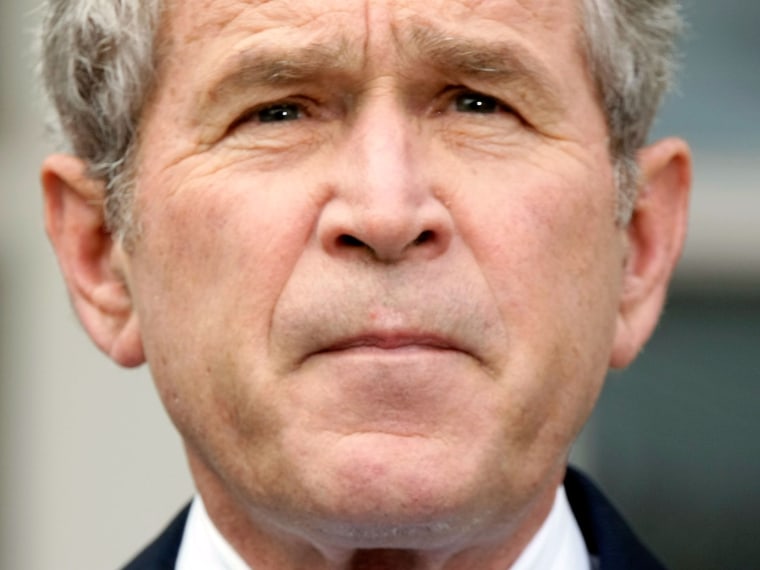George W. Bush’s presidential library and archive opened in Dallas on Thursday, pushing Americans to grapple with his legacy. But you don't need to visit Dallas to do that. Bush's War on Terror, abandoned immigration efforts, economic policies, the gutting of the EPA and the construction of the Department of Homeland Security are all being tested in real time.
Here’s a look at the issues Bush left behind, and how the Obama administration has dealt with them:
War on Terror
Bush: Following the 9/11 attacks, Bush launched an exceptionally aggressive foreign policy, starting wars in Afghanistan and Iraq against the sometimes amorphous enemy, "terror." The Iraq War proved particularly controversial, sold as a relatively easy mission that would prevent Saddam Hussein from using weapons of mass destruction. The cakewalk become a quagmire. The WMD's did not exist, and U.S. war planners underestimated the Iraqi insurgency. The war on terror also produced the Patriot Act, Guantanamo, extraordinary renditions, torture, Abu Ghraib, and the modern surveillance state.
Obama: He stopped using the term "War on Terror," but last week’s Boston Marathon bombings put the issue in the spotlight once again. A number of right-wingers are essentially asking President Obama to resurrect Bush’s much maligned initiative. GOP Rep. Peter King and former Rep. Joe Walsh are pushing for increased surveillance of Muslims living in America. Donald Trump has suggested waterboarding suspect Dzhokhar Tsarnaev. A group of Republicans including Sen. Lindsey Graham tried persuading the White House to treat Tsarnaev as a “enemy combatant” instead of immediately giving him a civilian trial. Obama axed that effort on Tuesday. In terms of the U.S. presence abroad, Obama has withdrawn troops from Iraq but okayed a military presence in Afghanistan. The drawdown of the troops there will be complete by the end of 2014. The controversial detention facility in Guantanamo is still in operation.
Economy
Bush: During his tenure, Bush arguably created one of the worst financial crises in our history. He helped deregulate Wall Street and implemented a major tax cut that especially favored the wealthiest Americans. Critics say his sweeping financial deregulation helped create the housing bubble (which burst) and allowed financial institutions to seek out risky trades, ultimately leading to the financial crash and Great Recession.
Obama: The current president inherited much of economic fallout. While Bush pushed for lower tax rates for everyone, Obama pushed for higher rates for America’s wealthiest. However, Bush’s tax cuts for the middle class in Obama era are now permanent. Obama did take bold action, signing off on the American Recovery and Reinvestment Act of 2009. The program pumped more that $800 billion toward creating jobs and providing relief programs for those hurt by the recession. According to FactCheck.org, the economy has added more jobs since Obama took office than it did in Bush’s entire eight years in office.
Environment:
Bush: Two words: Hurricane Katrina. The natural disaster, which killed at least 1,833 people, is a blot on Bush's legacy. He was heavily criticized for his slow response, especially when the White House released photos of him on a plane far above New Orleans, looking out the window at the devastation below. He also praised Michael Brown, the widely derided director of the Federal Emergency Management Agency, by saying "Brownie, you're doing a heckuva job," even as the agency was skewered for its inept response. In addition, the Bush administration cut funds to the EPA.
Obama: The president was largely praised for his response to Hurricane Sandy. Now the president’s environmental policy is being tested with the recent fertilizer plant explosion in West, Texas, which killed 14 and wounded at least 200, along with the recent oil spills in Arkansas and Texas. In terms of the EPA, in Obama’s 2014 budget, he calls for a total spending of $8 billion, although that’s a 9% reduction from 2013 levels.
Immigration:
Bush: The former president sought to overhaul the country’s immigration system. A 2007 bill fell 14 votes short of the 60 needed in the Senate to advance. The legislation, tied to border security, would have legalized approximately 11 million illegal immigrants and created a temporary worker program. Bush essentially abandoned immigration following the Sept. 11 attacks. He has said he regrets not passing meaningful reform.
Obama: Immigration is back on the country’s radar, although the Boston bombing could derail that initiative. The bipartisan group of senators, known as “Gang of Eight” has released a plan that would strengthen the border and allow undocumented immigrants to eventually become legal residents, and then citizens.
Social Security:
Bush: The Republican attempted to reform Social Security during his second term. The plan included partial privatization, personal Social Security accounts and an option to allow Americans to divert some of their Social Security tax into secure investment. Democrats were against privatization. Public support for the plan declined. The financial crash at the end of Bush's term emphasized the risks of depending on the market for retirement income.
Obama: The president has put forth a plan on Social Security. His 2014 budget proposal includes cuts to Social Security and Medicare. The proposal has angered some Democrats, but it’s goal is to entice Republicans to consider tax increases.
